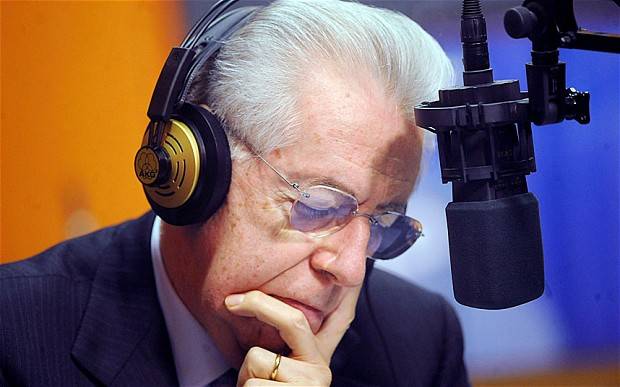Monti in the Arena with a Cup of Tea
ROME - He is no longer a glacial emperor seated above the fray, but on an equal footing with the other gladiators, right, left and center, many of whom are more expert at the game than he. Quick judgments matter: because national general elections, teamed now with elections to the Lazio and Lombard regional assemblies, are only seven weeks away, there is little time to get campaigns back on track if they are sliding off the rails.
One of the pithiest early judgments came from Mario Secchi, the moderate editor-in-chief of the Rome daily Il Tempo. "He has jumped into the ring with the smile of a man carrying a cup of tea," sentenced Secchi. The smile is because, "He is amused at trying to overturn the political paradigm of the past twenty years by building first an 'agenda,' then a campaign (its slogan is 'With Monti for Italy') and lastly a coalition." The idea, says Secchi, is that Monti laid down the railway tracks while he was in government, then bought some coal and now he's building a locomotive to which he is attaching train cars. Will he run off the rails? Get there in time? "That will depend upon the passengers. The conductor is fine, but on a train you also need someone to take the tickets."
Needless to say, former Premier Silvio Berlusconi has been less generous with Monti, calling him a "mini-leader" (leaderino). It was, of course, Berlusconi who brought down the Monti government in December, in a vote against Monti's austerity package. Speaking Jan. 3, Berlusconi declared that Monti "is a rotter (mascalzone) with a guaranteed income [from his position as lifetime senator] who lies saying that part of our Freedom Party is against liberalization. I'm beginning to doubt his ability to make judgments." (This was a retort to Monti, who had just said virtually the same thing about Berlusconi.) Berlusconi is currently engaged in tough negotiations with his once and future allies of the Northern League, and - hint, hint - has informed voters that he may not necessarily be premier if his party and/or coalition triumphs. And a triumph is what he predicts, claiming that his polls show that from its starting point of 15% a month ago his party has already surged to 20%. "In the end we will win 40% of the vote, the same as in the elections of 2008."
However exaggerated such optimism, Berlusconi remains a formidable campaigner, and no one is writing him out of the fray. Pollsters say his appeal is to two specific social strati, one on the emotional, the other, on the rational level. His message - jokes, lively chatter, fluency, personal success, frequent appearances in the media - speaks to ordinary "folks" whose primary news source is television. "This technical government has been a disaster," Berlusconi says heatedly. "We're in a full recession. We have to let the Italians know that we are still here and that we have a program for digging Italy out of recession." His second audience is composed of the small businessmen who resent Italy's heavy taxation. Striking out at both Monti and the leader of the center-left, Pier Luigi Bersani, he says, "The left wants a luxury tax on houses, on your savings and your stocks." His third weapon is support in Southern Italy, thanks to a new agreement with the Sicilian politician Gianfranco Micchiche' for support from his action group "Grande Sud" (Great South`). Micciche', after working with Marcello Dell'Utri in Berlusconi's PR company Publitalia '80, was elected president of the Sicilian Regional Assembly in 2006. He was the subject of controversy for his opposing naming the Palermo airport in the memory of the Mafia victims Judges Giovanni Falcone and Paolo Borsellino.
As this shows, for Monti the coming election will not be a nice cuppa tea. One of his earliest mistakes was to allow the PR department of the premier's office to release his new party's action program, the "agenda." Since then he has made other errors. According to Monti's old friend Eugenio Scalfari, editor-in-chief of the daily La Repubblica, Monti has already proven a disappointment. Scalfari's reasoning is that Monti's program coincides to great degree with that of Pierluigi Bersani, who had been Monti's strongest supporter in Parliament during the past year of restoring Italy's international credibility and keeping Italy from going bankrupt. Today the two political leaders are at loggerheads, battling against each other instead of making common cause, in Scalfari's view.
Monti was "less than generous" in failing to acknowledge that the success of the Monti government came about thanks to Bersani. The failure to come to an agreement with Bersani, whose party is expected to win over 30% of the vote, risks throwing the country into chaos, Scalfari warns darkly, and has implications for all of Europe. Making common cause instead with the centrists like Pierferdinando Casini, even with Vatican support, the outcome may be disappointing, Scalfari predicts. Addressing Monti directly, he adds: "You have changed.... I am worried at what you have become now."


































i-Italy
Facebook
Google+
This work may not be reproduced, in whole or in part, without prior written permission.
Questo lavoro non può essere riprodotto, in tutto o in parte, senza permesso scritto.